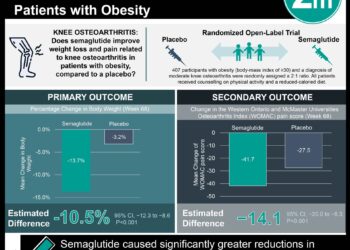Specific commercial weight loss programs linked with greater weight loss than education or behavioral counseling
1. From a systematic review, Weight Watchers and Jenny Craig were associated with greater weight loss at 12 months than no intervention, education alone, or behavioral counseling.
Evidence Rating Level: 1 (Excellent)
Study Rundown: Two in three Americans are overweight or obese, and collectively, Americans spend up to $2.5 billion annually for commercial weight loss programs. This systematic review of trials compared commercial weight loss programs to controls (i.e., no weight loss intervention, education alone, or behavioral counseling) to compare efficacy in achieving weight loss after one year. Both Weight Watchers and Jenny Craig were consistently associated with greater weight loss than control interventions. Although results were promising for Nutrisystem, no studies followed participants for a year. Low-calorie replacement programs (e.g., Health Management Resources, Medifast and OPTIFAST) were associated with short-term weight loss, but data were also lacking on the durability of this weight loss. Among “self-directed” weight loss programs, only Atkins showed consistent, albeit slim, benefit over control interventions. Unfortunately, this review did not report head-to-head comparisons of different commercial programs, so the programs could not be directly compared to each other. Furthermore, this review was also limited by the high potential for bias among the bulk of studies included. Nevertheless, this review suggests that Weight Watchers and Jenny Craig may be effective programs for weight loss, and it identifies other potentially valuable programs, such as Nutrisystem, that warrant further research.
Click to read the study, published today in the Annals of Internal Medicine
Relevant Reading: Meta- and cost-effectiveness analysis of commercial weight loss strategies
In-Depth [systematic review]: This systematic review is an update of a 2005 review of commercial weight loss programs versus control interventions among overweight or obese Americans. The primary outcome was mean percentage weight change, with a target endpoint of “long-term” (i.e., 1 year) durability of change following initiation of the intervention. Commercial weight loss programs were excluded if they did not focus on weight loss, endorsed medications/supplements, were residential programs or were not available in the United States. A total of 45 individual trials analyzing 11 commercial weight loss programs were included. While data was limited for most of these programs, evidence supporting long-term efficacy of Weight Watchers and Jenny Craig was consistent across several studies. After 12 months, individuals who used Weight Watchers and Jenny Craig lost a minimum of 2.6% and 4.9% more weight, respectively, than individuals who used control interventions. Minimal data on adherence to interventions or harms from these programs were reported in trials. Future head-to-head studies could assess the comparative effectiveness of these programs and evaluate durability of weight changes.
Image: PD
©2015 2 Minute Medicine, Inc. All rights reserved. No works may be reproduced without expressed written consent from 2 Minute Medicine, Inc. Inquire about licensing here. No article should be construed as medical advice and is not intended as such by the authors or by 2 Minute Medicine, Inc.






![Small molecule drug may improve cancer-killing efficacy of oncolytic virus [PreClinical]](https://www.2minutemedicine.com/wp-content/uploads/2015/04/Microtubules_in_the_leading_edge_of_a_cell.tif-75x75.jpg)
